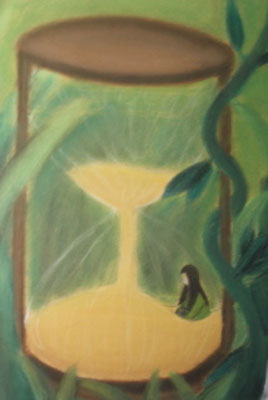All Nonfiction
- Bullying
- Books
- Academic
- Author Interviews
- Celebrity interviews
- College Articles
- College Essays
- Educator of the Year
- Heroes
- Interviews
- Memoir
- Personal Experience
- Sports
- Travel & Culture
All Opinions
- Bullying
- Current Events / Politics
- Discrimination
- Drugs / Alcohol / Smoking
- Entertainment / Celebrities
- Environment
- Love / Relationships
- Movies / Music / TV
- Pop Culture / Trends
- School / College
- Social Issues / Civics
- Spirituality / Religion
- Sports / Hobbies
All Hot Topics
- Bullying
- Community Service
- Environment
- Health
- Letters to the Editor
- Pride & Prejudice
- What Matters
- Back
Summer Guide
- Program Links
- Program Reviews
- Back
College Guide
- College Links
- College Reviews
- College Essays
- College Articles
- Back
The Significantly Over-Arching Realm of Insignificance: Define Time.
I asked a student in eighth grade to "define 'time'" in one word.
"Confusing."
"How do you figure that?"
"Because when you think about it, time is always passing. You can't say 'right now' and be correct---[moments] are always in the past. Then think about how time started. What was the first day like? And before that? How can there have been a place with no time? Isn't it funny when people say, 'This is a picture of me when I was younger?' I mean, obviously it is. You can't have a picture of you in the future."
Her response was so profound that it caught me off guard; I had never expected such a response, especially not from someone who said, "I don't know what those words mean, I'm only in eighth grade!" when given examples of words other people had given, such as "existential" and "corrosive." Yet her definition prompted me to think more about time and its origins. "What is time?" I asked myself (instaed of resorting to definitions from others).
At first I began thinking about basic words: comfort, memory, possibility. After acceping these words as viable definitions and moving on to another thought, I was struck with the idea of a tie change. How are we able to manipulate time as we do? A "spring forward" occurs every year in almost all of the states. How are we able to lost an hour of our lives without changing anything but the short hand of a clock?
Is time insignificant?
I took my question to the internet. One thought was more pronounced than the rest: "How can the concept 'before' have any meaning except within time?" Without trying, the question answered mine. Time is not insignificant. Time controls everything. Time is everything. Yet a mere sixty minutes is insignificant because of the infinity of time itself.
Another student described time as "life." If time is life, and life is a cycle, is time simply a series of cycles? Each person provides an alternate definition and explanation, so either there is no clear definition of time, or time is about perspective. Every person, every animal, every plant lives within a section of time. Each of these organisms is provided with their own section of time. Their own little piece, given unto them, to do use however they wish. They may choose to define it however they choose, or choose not to define it at all. They may never wonder about its definition; after all, plants cannot "wonder." Yet maybe that is all time is...maybe time is simply wonder.
The White Rabbit in Lewis Carroll's Alice's Adventures in Wonderland has an obsession with time. An obsession not with the definition, but with the concept. "I shall be too late!" he repeats (Carroll 1). The characters in Carroll's Wonderland even address "time" as "Time," giving the concept a proper title as if it is their God. Despite this obscure idolization, Carroll never addresses the source of the Rabbit's obsession. Perhaps the White Rabbit does not want to waste the only section of Time that he has been given. Perhaps his preoccupation with his pocket watch stems from the Rabbit not wanting to disrupt the sanctity of the routine arithmetic that always accompanies him. Perhaps that is why we often worry about how "life is short." Not because of the fear of wasting the only time we are given, but because of the fear that what we do with it will cause us to lose the one partner we are always accompanied by:
Time.

Similar Articles
JOIN THE DISCUSSION
This article has 0 comments.

The twelve--yes, twelve (think hours of a clock)--most prevalent one-word definitions I recieved from my peers are as follows:
Perpetual
Enveloping
Possibility
Comfort
Memory
Life
Unavoidable
Corrosive
Lost
Wonder
Existential
Death